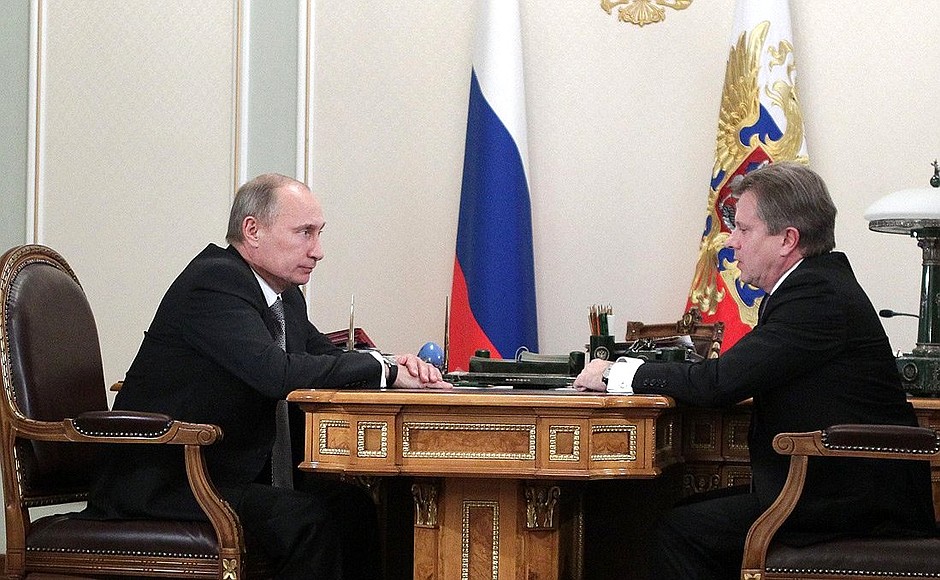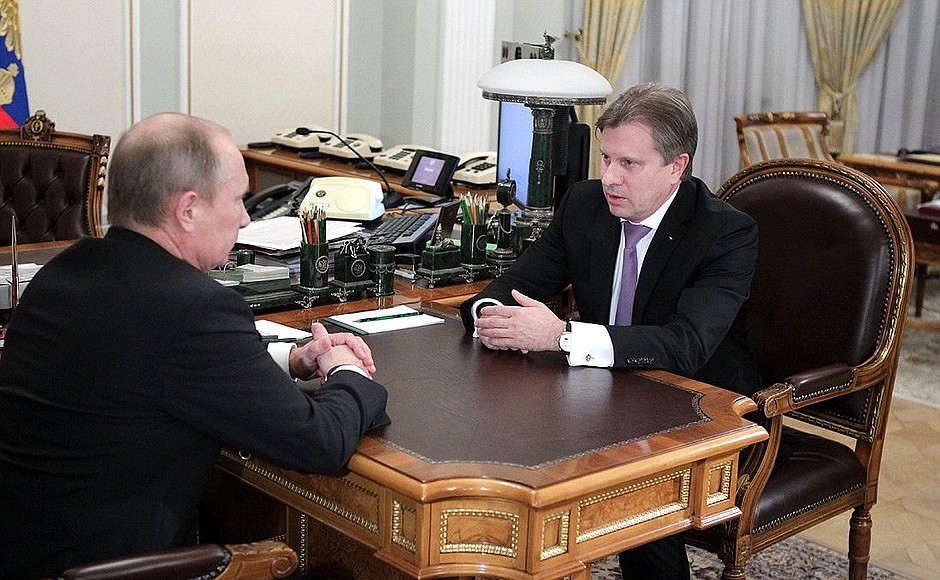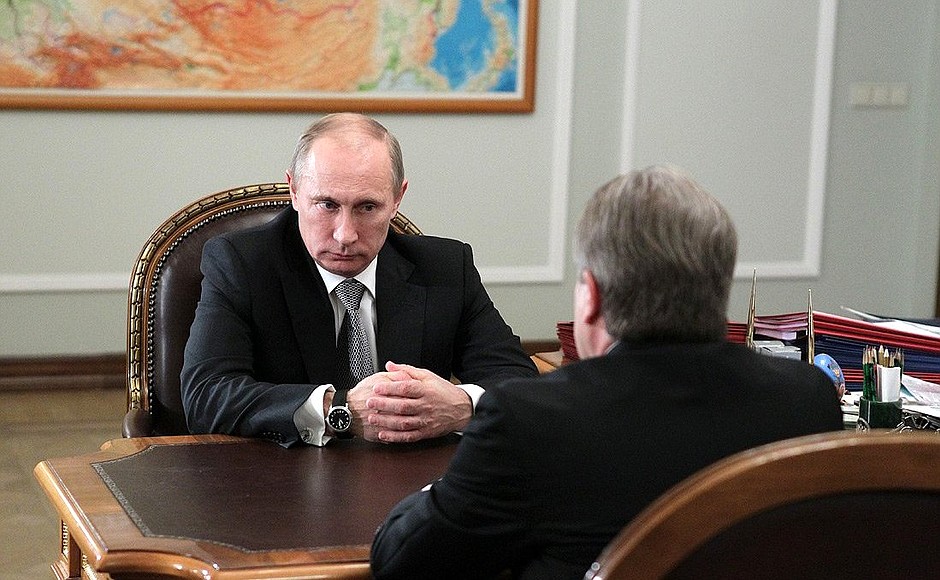* * *
President of Russia Vladimir Putin: Let’s start by looking at the results of Aeroflot, Russia’s main carrier. What is the economic situation like and what is going on in the company? Do you think the passengers are happy?
I would also like to hear about the low-cost air travel project. What has been done so far in this area? What kind of analysis has been carried out? I know that it seems some legislative amendments will have to be made. Let’s discuss this too.
General Director of Aeroflot Vitaly Savelyev: Mr President, Aeroflot’s market share remains stable. We are carrying out the strategy approved by our Board of Directors. Our objective is to be among the top 5 European carriers and the top 20 global carriers by 2025.
We have maintained leading positions in the services we provide, and we see this as very important. The latest IATA [International Air Transport Association] ratings put us in first place for business class in Europe, and in second place in economy class. There are some nuances to work on here and we will improve the situation this year. In the SkyTeam alliance we were first in economy class and kept our place in business class, and, for the first time ever, we were in first place for on-ground service too.
We have evaluated our loyalty index. We were the first civil aviation company to do so in 2010, as I told you. The passenger loyalty index, known as the NPS, showed that we have had an increase of 8 percent. This is a substantial increase because every one percent in growth represents an added $15 million to the company’s revenue.
Furthermore, our development strategy will see us establish Russia’s first aviation holding, to be created on the base of assets we have received from Rostekhnologii.
The planes we buy are not cheap, and Aeroflot therefore cannot be a cheap airline. We have also maintained high catering standards and, according to the results for last December (this year’s assessment has not been made yet), we were third in the world for the quality of food we provide, as I reported to you last time we met. We will remain in this segment. Thus, Aeroflot will stay in the premium segment niche. Our current results and the services we provide to our passengers show that the company is in a stable situation economically.
Our seat occupancy rate was up by almost three percent over the first three quarters of this year compared to the same period last year. Last year, we had a seat occupancy rate of 76 percent, but this year it is almost 79 percent. A one-percent increase in seat occupancy boosts our revenue by around 2 billion rubles, which is a substantial increase.
What opportunities does this give us? First, we can invest in developing our subsidiary companies. Our subsidiaries provide passenger services that are around 20–25 percent cheaper than Aeroflot’s services. The big issue now, as your instruction, which we are acting on, made clear, is to establish a national low-cost airline.
You are right in that we would need to change some laws, make some amendments to the Air Code, to be more precise, in order to establish this low-cost airline. We are ready to do this. If the amendments to the Air Code are made, we would be able to do it within six to twelve months at the most…
Vladimir Putin: What amendments specifically?
Vitaly Savelyev: First, we want to make an amendment to article 108 of the Air Code prohibiting passengers from selling non-returnable tickets. Countries all around the world apply this rule, in Europe, in America, but for some reason it does not apply here and this puts us in an uncompetitive situation.
In other words, when passengers buy low-cost tickets they must be aware that these tickets cannot be returned. This applies not only to low-cost airlines but also to ordinary carriers, though to a lesser extent.
The second amendment concerns article 56 of the Air Code and would allow us to hire non-resident pilots. This is important because all of the country’s airlines face a shortage of pilots today and there is a price war going on, with the airlines putting up prices and raising pilots’ wages. This will be a significant factor for the low-cost airline.
An Aeroflot captain currently earns 420,000 [more than $13,000] a month. This, minus taxes, is the equivalent of a Lufthansa pilot. But if we had enough pilots and did not have to worry about a shortage, we could take real steps to regulate the conditions.
We also need to change the federal aviation rules. There are several amendments we need to pass. First, in case of low-cost airlines, passengers will need to pay for their baggage. At the moment, passengers can take 10 kilos of baggage cost-free.
We also need to allow the low-cost airline not to be obliged to provide in-flight meals for passengers. At the moment, federal aviation rules prohibit this.
Finally, the low-cost airline should have its own airport. There are several airports around Moscow that could serve as a hub for low-cost airlines and would be able to keep airport taxes to a minimum.
Vladimir Putin: These are all issues we can discuss. Some of the points you mention are sensitive issues that concern the labour market above all, and that we need to consider carefully and discuss with the trade unions.
But I think we should consider these matters. It would be right to establish a carrier of this type, because many passengers would be interested in using its services, which would be more affordable, more within the reach of all those who do not earn so much. I think this would be a big plus for the airline.
Vitaly Savelyev: Yes, you are absolutely right. This is one of our priority development areas. I want to add that we are preparing for a new record in passenger traffic this year. We have carried more than 13 million passengers over the first 9 months of this year. Last year, we set an absolute record for Aeroflot with 14 million passengers for the year, but this year we have already reached 13.3 million.
Also, Mr President, Aeroflot is in a financially stable situation today. According to the industry publication Air Transport World, we were in 10th place in the world last year for net profits, and 15th place for operating profit. In other words, the company is genuinely stable in its work and really is earning honest money.
We therefore propose the initiative, if you support it, of de-monopolising the air transport market, starting with ourselves. We want to set the example for all airlines in Russia. The domestic air transport market has already been liberalised and no one has a monopoly now. But many companies, including Aeroflot, still have monopoly routes when it comes to destinations abroad.
We want to take the initiative and set the example by renouncing our monopoly on 34 routes abroad. We would support having other Russian airlines come on to these routes in order to bring down prices, but we want at the same time to be able to operate more frequent flights.
This would slightly lower our profit and revenue, but we think it would also bring down costs, and if you support the proposal, we are ready to take this step and renounce these routes.
Vladimir Putin: Good, let’s discuss all of this in more detail. Overall, it seems to me like a good initiative.
<…>


